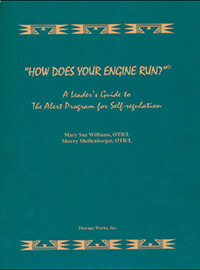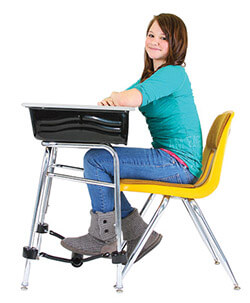School-based occupational therapists are familiar with receiving requests for assessments or interventions for children with delays of all kinds. What happens when the service request is for a child that has been identified as gifted or talented, but has no diagnosed disorders (non-disabled)? Will OT treatment help a child whose brain is globally and permanently wired for intense responses?
Some common behavioral characteristics of the gifted often suggest that sensory processing difficulties could be present:
- Sensitivity to lighting, fabrics, and other sensory stimulation.
- Seeking strong sensory-motor input throughout the day.
- Difficulty tolerating school rules such as taking turns or sharing the spotlight in discussions.
- Pursues interests in isolation or with adults rather than with peers.
- Resistance to complete assigned projects; pursues personal interests.
Theorists such as Kazimierz Dabrowski have attributed these and other behaviors to multiple “overexcitabilites.” He identified five primary areas of over-excitability in gifted individuals: psychomotor, sensory, intellectual, imaginational and emotional. Not considered to be signs of neurological disorders, they are thought to be the result of a brain that is wired differently than children of average abilities. Brain imagining studies suggest that the gifted make faster and more complex associations between stimuli. They perceive experiences and interactions with more depth and intensity than other children, and have an inborn drive to follow their passions.
These brain characteristics are not necessarily problematic for every gifted child. When teachers and parents know how to support children who learn differently, the gifted child can become a positive force and even a leader in the classroom. Although scores on the Sensory Profile or on other sensory-based assessments may suggest an SI diagnosis, there are gifted children that manage successfully in school and at home without intervention. They may even come up with their own sensory diet, having identified activities that provide what they need. For example, a child that seeks sensory input could engage in complex art projects or specific sports activities that provide visual, tactile, vestibular or proprioceptive input. A sensory-sensitive child may happily use an unoccupied corner of the room with indirect light for free reading time.
Some gifted children will have difficulty in class, especially when their behavior is at odds with school routines and social norms. A child that takes over discussions or refuses to work on a group project may disrupt a classroom or be unable to complete assignments even though their academic abilities exceed their peers. A child that refuses to wear a tie or participate in music class may need help to handle the demands of school.
 Anne Cronin, OTR, FAOTA has recommended that gifted children can benefit from sensory diets and modulation strategies found in programs such as “ It is worth noting that gifted children may be able to comprehend and implement programs at earlier ages and stages than typical children. Children who were reading at 3 or creating complex imaginary civilizations at 5 may learn and incorporate a sensory diet almost immediately on accepting its value. Such students may even improve on your suggested activities with one of their own creation! This is the time to collaborate with them and provide them with the positive feedback they may need in order to try new ways of responding at school and at home.
Anne Cronin, OTR, FAOTA has recommended that gifted children can benefit from sensory diets and modulation strategies found in programs such as “ It is worth noting that gifted children may be able to comprehend and implement programs at earlier ages and stages than typical children. Children who were reading at 3 or creating complex imaginary civilizations at 5 may learn and incorporate a sensory diet almost immediately on accepting its value. Such students may even improve on your suggested activities with one of their own creation! This is the time to collaborate with them and provide them with the positive feedback they may need in order to try new ways of responding at school and at home.



The same sensory-based equipment that we recommend for other children with sensory processing problems could help gifted children as well. Fluorescent Light Filters effectively dim harsh lighting, and fidgets for feet and hands can be effective tools that don’t disrupt productive work. Because gifted children need to learn to manage and modulate their intense and complex responses, there are many ways that OTs could be helpful to these children.
Gifted children may need a wider variety of tools to give them the desired novelty they crave, or they may reject many ideas rapidly. Always ask for an explanation and be ready with alternatives. A gifted child may be able to project many steps ahead of you and identify roadblocks that you don’t anticipate…yet!
Cathy Collyer, OTR, LMT, PLLC
 Cathy Collyer, OTR, LMT has treated children with neurological, orthopedic and sensory processing disorders for over 20 years. She is the author of The Practical Guide To Toilet Training Your Child With Low Muscle Tone.
Cathy Collyer, OTR, LMT has treated children with neurological, orthopedic and sensory processing disorders for over 20 years. She is the author of The Practical Guide To Toilet Training Your Child With Low Muscle Tone.
